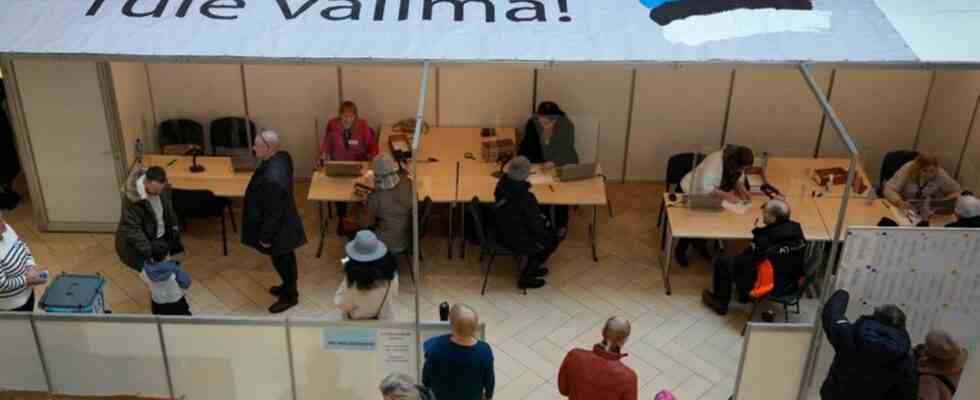parliamentary election
Estonia: Prime Minister Kallas’ party clearly wins
According to preliminary information from the electoral commission, turnout was 63.7 percent. photo
© Sergei Grits/AP/dpa
Estonia is considered one of the biggest supporters of Ukraine. Not least because of Prime Minister Kaja Kallas. In the parliamentary elections, she and her party clearly prevailed.
In view of the Russian war in Ukraine, the people of Estonia are counting on political continuity: In the parliamentary elections in the Baltic EU and NATO country, they once again made the economic liberal party of Prime Minister Kaja Kallas the strongest force. This means that the 45-year-old should be able to continue her clear and tough course against neighboring Russia and its war of aggression. Kallas has been the first woman in Estonia’s history to head the government since 2021 – and is considered one of the most resolute supporters of Kiev in Europe.
Estonia shares nearly 300 kilometers of border with Russia and sees aggressive war against Ukraine as a direct threat to its security. Since the beginning of the war, Kallas has been a staunch supporter of EU sanctions against Moscow and arms sales to Ukraine. Under her leadership, Estonia gave more than 1 percent of its economic output to Ukraine in the form of military aid and took in more than 60,000 war refugees. She resolutely called for a strengthening of NATO’s eastern flank.
Kallas’ reform party won 37 of 101 seats in parliament in Tallinn – three more than in the previous election in 2019. According to the election commission, it remains by far the strongest force in the Riigikogu parliament. With more than 31,000 votes in her constituency, Kallas herself set a record – more than anyone since Estonia regained independence from the Soviet Union in 1991.
Coalition question still open
The lawyer and daughter of former EU Commissioner Siim Kallas is currently leading a tripartite alliance with the Social Democrats (nine seats) and the conservative party Isamaa (eight seats), both of which lost seats. Kallas initially left open whether she would continue the coalition or look for new partners. All options should be discussed within the party beforehand.
Two opposition parties came in second and third: the right-wing populist party EKRE (17 seats) and the left-wing Center Party (16 seats), both of which lost seats. The biggest winner of the election was the liberal party Eesti 200, which will be represented in parliament for the first time with 14 seats. Experts even consider participation in the government to be conceivable.
Head of state Alar Karis, who has to give the order to form a government, called for speedy coalition talks. “The current situation is not favorable for a long period of uncertainty,” he said on Monday, announcing meetings with representatives of all parties elected to parliament. “People expect a quick solution or relief from various economic, social and security-related problems.”
Voting via the Internet
Many citizens are very worried about the rapid increase in inflation, which has caused the cost of living to rise sharply – the rate of inflation was almost 18 percent recently. This made EKRE a key issue in the election campaign, which, alongside the Ukraine war, was determined by socio-political issues.
A special feature of the election was again the possibility of voting via the Internet, which Estonia introduced in 2005 as the first country in Europe. Overall, more than half of all votes were cast digitally – a record for “e-voting”.
The heads of government of neighboring Latvia, Lithuania and Finland were among the first to wish well-wishers from abroad. Kallas’ clear victory was also welcomed in Brussels.

